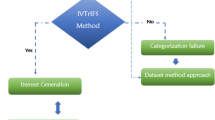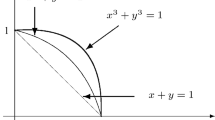Abstract
After analyzing the existing ranking methods of Pythagorean fuzzy numbers (PFNs) by several examples, some shortcomings of the existing ranking methods are pointed out. To conquer such shortcomings, we propose a novel approach to rank PFNs by using power index measure and score function of PFN. Simultaneously, the rationality of the proposed ranking method is analyzed theoretically. Besides, the techniques of aggregating Pythagorean fuzzy information are investigated. To expand the practical application scope of the DOWA operator to Pythagorean fuzzy environments, we present two kinds of Pythagorean fuzzy monotonic DOWA (PFMDOWA) operators by utilizing the power index measure of PFN. If the weights of attributes are considered, we further develop two kinds of Pythagorean fuzzy hybrid monotonic DOWA (PFHMDOWA) operators. The main advantage of the PFMDOWA operator and PFHMDOWA operator is that the weights associated to the operators can be generated and adjusted dynamically. Lastly, a decision making example is given to verify the flexibility and rationality of the presented techniques.
Similar content being viewed by others
References
Xu, Z.S., Da, Q.L.: An overview of operators for aggregating information. Int. J. Intell. Syst. 18, 953–969 (2003)
Yager, R.R.: Pythagorean membership grades in multicriteria decision making. IEEE Trans. Fuzzy Syst. 22, 958–965 (2014)
Yager, R.R.: On ordered weighted averaging aggregation operators in multiciteria decision making. IEEE Trans. Syst. Man Cybern. 18, 183–190 (1988)
Liu, X.W., Lou, H.W.: Parameterized additive neat OWA operators with different orness levels. Int. J. Intell. Syst. 21, 1045–1072 (2006)
Fernández Salido, J.M., Murakami, S.: Extending Yager’s orness concept for the OWA aggregators to other mean operators. Fuzzy Sets Syst. 139, 515–542 (2003)
Liu, X.W.: The orness measures for two compound quasi-arithmetic mean aggregation operators. Int. J. Approx. Reason. 51, 305–334 (2010)
Filev, D.P., Yager, R.R.: On the issue of obtaining OWA operator weights. Fuzzy Sets Syst. 94, 157–169 (1998)
Xu, Z.S.: An overview of methods for determining OWA weights. Int. J. Intell. Syst. 20, 843–865 (2005)
Xia, M.M., Xu, Z.S.: Hesitant fuzzy information aggregation in decision making. Int. J. Approx. Reason 52, 395–407 (2011)
Yager, R.R., Filev, D.P.: Parameterized and-like and or-like OWA operators. Int. J. Gen. Syst. 22, 297–316 (1994)
Yager, R.R.: Families of OWA operators. Fuzzy Sets Syst. 59, 125–148 (1993)
Yager, R.R.: OWA aggregation over a continuous interval argument with applications to decision making. IEEE Trans. Syst. Man Cybern. Part B 34, 1952–1963 (2004)
Wei, G.W.: Dependent uncertain linguistic OWA operator. Lect. Notes Comput. Sci. 5009, 156–163 (2008)
Fullér, R., Majlender, P.: An analytic approach for obtaining maximal entropy OWA operator weights. Fuzzy Sets Syst. 124, 53–57 (2001)
Torra, V.: The weighted OWA operator. Int. J. Intell. Syst. 12, 153–166 (1997)
Yager, R.R.: Generalized OWA operators. Fuzzy Optim. Decis. Making 3, 93–107 (2004)
Torra, V.: OWA operators in data modeling and reidentification. IEEE Trans. Fuzzy Syst. 12, 652–660 (2004)
Ahn, B.S.: On the properties of OWA operator weights functions with constant level of orness. IEEE Trans. Fuzzy Syst. 14, 511–515 (2006)
Sang, X.Z., Liu, X.W.: An analytic approach to obtain the least square deviation OWA operator weights. Fuzzy Sets Syst. 240, 103–116 (2014)
Xu, Z.S.: Dependent OWA operators. Lect. Notes Comput. Sci. 3885, 172–178 (2006)
Zeng, W.Y., Li, D.Q., Gu, Y.D.: Monotonic argument dependent OWA operators. Int. J. Intell. Syst. 33, 1639–1659 (2018)
Zadeh, L.A.: Fuzzy sets. Inf. Control 8, 338–356 (1965)
Bellman, R.E., Zadeh, L.A.: Decision-making in a fuzzy environment. Manag. Sci. 17(4), B141–B164 (1970)
Atanassov, K.: Intuitionistic fuzzy sets. Fuzzy Sets Syst. 20, 87–96 (1986)
Torra, V.: Hesitant fuzzy sets. Int. J. Intell. Syst. 25, 529–539 (2010)
Garg, H.: A new generalized Pythagorean fuzzy information aggregation using Einstein operations and its application to decision making. Int. J. Intell. Syst. 31(12), 886–920 (2016)
Zhang, X.L.: Pythagorean fuzzy clustering analysis: a hierarchical clustering algorithm with the ratio index-based ranking methods. Int. J. Intell. Syst. 33(9), 1798–1822 (2018)
Bilal, M.A., Shabir, M.: Approximations of Pythagorean fuzzy sets over dual universes by soft binary relations. J. Intell. Fuzzy Syst. 4, 1–17 (2021)
Gao, X.Z., Deng, Y.: Generating method of Pythagorean fuzzy sets from the negation of probability. Eng. Appl. Artif. Intell. 105(104403), 1–11 (2021)
Peng, X.D., Yuan, H.Y., Yang, Y.: Pythagorean fuzzy information measures and their applications. Int. J. Intell. Syst. 32(10), 991–1029 (2017)
Garg, H.: A novel correlation coefficients between Pythagorean fuzzy sets and its applications to decision-making processes. Int. J. Intell. Syst. 31(12), 1234–1252 (2016)
Li, D.Q., Zeng, W.Y.: Distance measure of Pythagorean fuzzy sets. Int. J. Intell. Syst. 33(2), 348–361 (2018)
Wei, G.W., Wei, Y.: Similarity measures of Pythagorean fuzzy sets based on the cosine function and their applications. Int. J. Intell. Syst. 33(3), 634–652 (2018)
Ren, P.J., Xu, Z.S., Gou, X.J.: Pythagorean fuzzy TODIM approach to multi-criteria decision making. Appl. Soft Comput. 42, 246–259 (2016)
Zeng, S.Z., Chen, J.P., Li, X.S.: A hybrid method for Pythagorean fuzzy multiple-criteria decision making. Int. J. Inf. Technol. Decis. Mak. 15, 403–422 (2016)
Zhang, X.L., Xu, Z.S.: Extension of TOPSIS to multi-criteria decision making with Pythagorean fuzzy sets. Int. J. Intell. Syst. 29, 1061–1078 (2014)
Ejegwa, P.A., Wen, S.P., Feng, Y.M., et al.: Some new Pythagorean fuzzy correlation techniques via statistical viewpoint with applications to decision-making problems. J. Intell. Fuzzy Syst. 10, 1–13 (2021)
He, T., Wei, G., Lu, J., Wu, J.: Pythagorean interval 2-tuple linguistic VIKOR method for evaluating human factors in construction project management. Iran. J. Fuzzy Syst. 17, 93–105 (2020)
Akram, M., Garg, H., Zahid, K.: Extensions of ELECTRE-I and TOPSIS methods for group decision-making under complex Pythagorean fuzzy environment. Iran. J. Fuzzy Syst. 17, 147–164 (2020)
Mohagheghi, V., Mousavi, S.M.: A new framework for high-technology project evaluation and project portfolio selection based on Pythagorean fuzzy WASPAS, MOORA and mathematical modeling. Iran. J. Fuzzy Syst. 16, 89–106 (2019)
Wei, G.W.: Pythagorean fuzzy interaction aggregation operators and their application to multiple attribute decision making. J. Intell. Fuzzy Syst. 33(4), 2119–2132 (2023)
Wei, G.W., Lu, M.: Pythagorean fuzzy power aggregation operators in multiple attribute decision making. Int. J. Intell. Syst. 33(1), 169–186 (2018)
Zeng, S.Z.: Pythagorean fuzzy multiattribute group decision making with probabilistic information and OWA approach. Int. J. Intell. Syst. 32(11), 1136–1150 (2017)
Peng, X.D., Yang, Y.: Fundamental properties of interval-valued Pythagorean fuzzy aggregation operators. Int. J. Intell. Syst. 31(5), 444–487 (2015)
Zhang, X.L.: Multicriteria Pythagorean fuzzy decision analysis: a hierarchical QUALIFLEX approach with the closeness index-based ranking methods. Inform. Sci. 330, 104–124 (2016)
Pan, L.P., Gao, X.Z., Deng, Y., et al.: Constrained Pythagorean fuzzy sets and its similarity measure. IEEE Trans. Fuzzy Syst. 30(4), 1102–1113 (2022)
Peng, X.D., Yang, Y.: Some results for Pythagorean fuzzy sets. Int. J. Intell. Syst. 30, 1133–1160 (2015)
Garg, H.: A new improved score function of an interval valued Pythagorean fuzzy set based TOPSIS method. Int. J. Uncertain. Quantif. 7(5), 463–474 (2017)
Garg, H.: A novel improved accuracy function for interval valued Pythagorean fuzzy sets and its applications in decision making process. Int. J. Intell. Syst. 32(12), 1247–1260 (2017)
Alrasheedi, M., Jeevaraj, S.: Membership score of an interval-valued Pythagorean fuzzy numbers and its applications. IEEE Access 11, 37832–37839 (2023)
Yager, R.R., Abbasov, A.M.: Pythagorean membership grades, complex numbers and decision making. Int. J. Intell. Syst. 28, 436–452 (2013)
Xu, Z.S., Chen, J., Wu, J.: Clustering algorithm for intuitionistic fuzzy sets. Inf. Sci. 178, 3775–3790 (2008)
Acknowledgements
The authors are grateful to the anonymous reviewers, for their excellent comments and valuable suggestions, and the Editor-in-Chief, Professor Wei-Yen Wang, for his kind help, that helps us improve this paper.
Funding
This work is supported by the Sci-tech Innovation Team Project of Xiamen Institute of Technology (Grant No. KYTD202005), the Joint Research Fund in Astronomy under Cooperative Agreement between the NSFC and CAS (Grant No. U2031136), and the National Natural Science Foundation of China (Grant No. 12371454).
Author information
Authors and Affiliations
Corresponding authors
Rights and permissions
Springer Nature or its licensor (e.g. a society or other partner) holds exclusive rights to this article under a publishing agreement with the author(s) or other rightsholder(s); author self-archiving of the accepted manuscript version of this article is solely governed by the terms of such publishing agreement and applicable law.
About this article
Cite this article
Bian, H., Zeng, W., Li, D. et al. Pythagorean Fuzzy Monotonic Argument Dependent OWA Operator and Its Applications in Multiple Attribute Decision Making. Int. J. Fuzzy Syst. 26, 1016–1029 (2024). https://doi.org/10.1007/s40815-023-01650-7
Received:
Revised:
Accepted:
Published:
Issue Date:
DOI: https://doi.org/10.1007/s40815-023-01650-7




